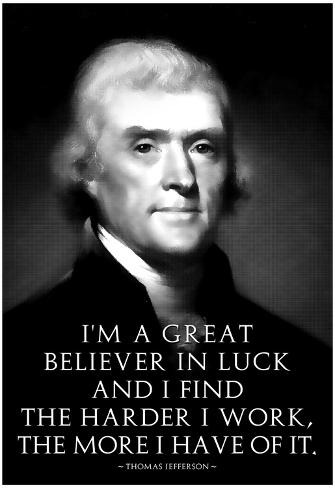
Jefferson's
view on the role of government was extremely similar to the modern Republican viewpoint.
He saw government as needing to have a laissez-faire
approach, stating that "a wise and frugal government, which shall restrain
men from injuring one another, shall leave them otherwise free to regulate their
own pursuits of industry and improvement" (pg. 381). He believed that as long as government provided
the freedom and opportunity in which to grow, the people would be able to pretty
much govern themselves.

On the other hand, Hamilton's ideas of government were what we would now term Democratic, as he believed that government should play more of an active role instead of just providing a few basic protections. In The Federalist Papers, Hamilton wrote that "the vigour of government is essential to the security of liberty; that, in the contemplation of a sound and well informed judgment, their interest can never be separated; and that a dangerous ambition more often lurks behind the specious mask of zeal for the rights of the people, than under the forbidding appearance of zeal for the firmness and efficiency of government" (pg. 409). He felt that a strong, more involved government was the only way to protect the people and insure freedom.
The one thing that these two political enemies had in common was that they both wanted what they thought was best for the people. They had no other working constitutional governments that they could use as a role model for their own. This was still in many ways the "American Experiment." They both wanted this to work, and realized that it would not if the government failed them. I think their differences can be best summed by a quote that I found online: "Hamilton feared anarchy and thought in terms of order; Jefferson feared tyranny and thought in terms of freedom" ("Hamilton vs. Jefferson").
On the other hand, Hamilton's ideas of government were what we would now term Democratic, as he believed that government should play more of an active role instead of just providing a few basic protections. In The Federalist Papers, Hamilton wrote that "the vigour of government is essential to the security of liberty; that, in the contemplation of a sound and well informed judgment, their interest can never be separated; and that a dangerous ambition more often lurks behind the specious mask of zeal for the rights of the people, than under the forbidding appearance of zeal for the firmness and efficiency of government" (pg. 409). He felt that a strong, more involved government was the only way to protect the people and insure freedom.
The one thing that these two political enemies had in common was that they both wanted what they thought was best for the people. They had no other working constitutional governments that they could use as a role model for their own. This was still in many ways the "American Experiment." They both wanted this to work, and realized that it would not if the government failed them. I think their differences can be best summed by a quote that I found online: "Hamilton feared anarchy and thought in terms of order; Jefferson feared tyranny and thought in terms of freedom" ("Hamilton vs. Jefferson").
Works Cited
"Hamilton vs. Jefferson." United States History. Country Studies. Federal
Research Division of the Library of Congress. Online book. Accessed October 4,
2012.
Research Division of the Library of Congress. Online book. Accessed October 4,
2012.
Perkins, George, and Barbara Perkins. The American Tradition in Literature.
12th ed. Vol. 1. Boston. McGraw-Hill, 2009. Print.
12th ed. Vol. 1. Boston. McGraw-Hill, 2009. Print.
No comments:
Post a Comment